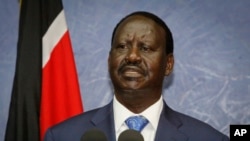NAIROBI —
Former Kenya prime minister Raila Odinga is accusing President Uhuru Kenyatta’s government of planning chaos in the country, before the ICC trials of the president and his deputy William Ruto in September and November. The Kenyan officials are accused of helping organize post-election violence that killed more than 1,100 people five years ago.
In an interview with local media late Sunday, Raila Odinga accused the new Kenyan government of creating a political crisis in the country.
The former prime minister said the government wanted to show Kenya was not governable as its president and his deputy prepared for trials at the Hague in the coming months.
“I know some people are trying to create a situation in the country before the end of August, so that they can begin to arrest some people and say the country is ungovernable, this is basically preparation for the ICC,” he said.
The Coalition for Reforms and Democracy alliance, to which Odinga belongs, said the government was looking for excuses to arrest its leaders.
Kenya's top security officials continue to question an Odinga aide, Eliud Owalo, about an allegation he is planning an Egypt-style revolution called the March Fourth Movement (M4M), a charge he denies.
But activist Okiya Omtatah said the group linked to Odinga’s aide was his. He said the group’s only concern was designing an electoral system that would eventually get the Kenyan electorate to vote on platforms by policy, not along tribal lines.
“Under [the] presidential system you find that, unless there is a system to ensure the voice of the grass roots across the country is considered in the election, then one or two groupings, who have got [a] majority or so, can just gang up and take over the presidency and capture the state,” said Omtatah.
Political observers said Kenyan politics has been based on tribal groupings that polarized the country, and the March 4 election was no different.
Omtatah said Owalo was not involved in M4M activities, and if the government has a problem with his movement they should go to court, rather than threatening people.
“They can raise their issue in a platform, in a forum where it can be addressed. If they [have] an issue there is a rule of law in Kenya, if they think its subversive let them go to court and I will take them on,” he said.
On Sunday, President Uhuru Kenyatta acknowledged uniting Kenyans divided along tribal lines remains an obstacle for his government. He said uniting his fellow countrymen will be his greatest achievement.
In an interview with local media late Sunday, Raila Odinga accused the new Kenyan government of creating a political crisis in the country.
The former prime minister said the government wanted to show Kenya was not governable as its president and his deputy prepared for trials at the Hague in the coming months.
“I know some people are trying to create a situation in the country before the end of August, so that they can begin to arrest some people and say the country is ungovernable, this is basically preparation for the ICC,” he said.
The Coalition for Reforms and Democracy alliance, to which Odinga belongs, said the government was looking for excuses to arrest its leaders.
Kenya's top security officials continue to question an Odinga aide, Eliud Owalo, about an allegation he is planning an Egypt-style revolution called the March Fourth Movement (M4M), a charge he denies.
But activist Okiya Omtatah said the group linked to Odinga’s aide was his. He said the group’s only concern was designing an electoral system that would eventually get the Kenyan electorate to vote on platforms by policy, not along tribal lines.
“Under [the] presidential system you find that, unless there is a system to ensure the voice of the grass roots across the country is considered in the election, then one or two groupings, who have got [a] majority or so, can just gang up and take over the presidency and capture the state,” said Omtatah.
Political observers said Kenyan politics has been based on tribal groupings that polarized the country, and the March 4 election was no different.
Omtatah said Owalo was not involved in M4M activities, and if the government has a problem with his movement they should go to court, rather than threatening people.
“They can raise their issue in a platform, in a forum where it can be addressed. If they [have] an issue there is a rule of law in Kenya, if they think its subversive let them go to court and I will take them on,” he said.
On Sunday, President Uhuru Kenyatta acknowledged uniting Kenyans divided along tribal lines remains an obstacle for his government. He said uniting his fellow countrymen will be his greatest achievement.




